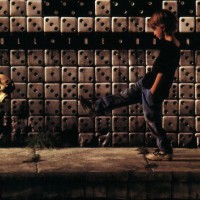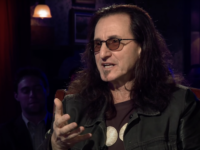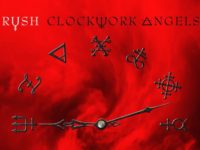When most think of Rush, their instrumental virtuosity (especially drummer Neil Peart) comes to mind first. Or the love (or hatred) of Geddy Lee’s vocals. Other times it’s Peart’s second role as lyricist for the band that garners attention, and it’s another love-or-hate area of focus: Ayn Rand, sci-fi, songs about balding, fights between dogs and, well, whatever a Bytor is, these are all common targets for those who want to throw stones.
We’re here to present an argument for the defense …
“ANAGRAM (FOR MONGO)” (PRESTO, 1989): While there’s not much you can do to convince someone that the music is good, if someone is determined to drag Rush down into the morass that is rock lyrics criticism, it’s easy to point to songs like “Anagram (For Mongo)” to show there’s something more going on with Rush.
As the title suggests, Peart employed anagrams throughout the song, turning one word, with a twist of letters, into another, knowing listeners will search for meaning throughout. “Reasoning is partly insane/image is just an eyeless game.” Is there a meaning of some kind? It’s hard to tell, and probably doubtful when taking the song as a whole. Certainly individual lines could hold some meaning (“There is no safe seat at the feast/Take your best stab at the beast” could be read as many things, and I’ve always read a political overtone into it) but the overall effect is just plain clever, like listening to witty banter.
In way, that’s a good description of listening to this band. — Tom Johnson
“A PASSAGE TO BANKOK” (2112, 1976): You can find plenty of rock songs about drugs in the 1970s (“Sweet Leaf” by Black Sabbath, “Cocaine” by Eric Clapton), but leave it to Rush to boast about going on some globe-trotting tour to exotic, far-off lands to savor the stuff straight from the sources. These guys aren’t street junkies but adventure seeking men of taste as Geddy Lee firmly informs us, “we’ll hit the stops along the way, we only stop for the best.” Now that’s getting a fix in ’76.
Looked at another way, “A Passage To Bangkok” is classic early-period Rush, with a large, gloomy guitar riff – it’s a close cousin to “Working Man” – making way for a cheerier tone in the chorus. Neil Peart took a break from sci-fi to come up with a more earthbound topic here that was, ahem, closer to the heart. As the tune that followed the side-long prog suite about a futuristic, Orwellian world in 2112, this tidy, three-and-a-half minute rocker made the ideal change-up.
A few years later, Nancy Reagan was appealing to kids to “just say no” but it was pretty hard for them to do that amidst one of Rush’s best straight-up hard rockers. Still is today. — S. Victor Aaron
“ROLL THE BONES” (ROLL THE BONES, 1991): You have to give them credit for trying. Rap, still relatively in its mainstream commercial infancy, was not something anyone, and I mean anyone would expect from a trio of guys widely perceived to be uptight and geeky. The joke’s on them, then, that not only did they pull it off with gusto, they did so with their usual Canadian sense of humor. You either get it or you don’t. And a lot of people don’t. But, you know, at least they tried, eh?
“Roll The Bones” is, at its heart, pretty much textbook Rush at this point in their career. The effects of the 1980s are wearing off quickly but touches are still present – horn-stab keyboards, strummy acoustic guitar backing and brief electric outbursts, and the de rigueur propulsive drumming, all glossed over with that unfortunate, oddly thin production that permeated seemingly everything. It is, essentially, everything most Rush fans will love and everyone else will completely ignore.
Except for one significant thing. Rap. Right there in the middle of the song, breaking from Geddy Lee singing Peart’s lyrics musing about the difference between fate and circumstance, suddenly the song drops into a keyboard-laden groove. And a deep voice begins to rap. And, well, it’s the kind of rap that we witnessed all too often back then, right when rap was beginning to take off – the rap of people who didn’t really get rap, but really wanted to partake. There was a scene in seemingly every TV show at the time where at least one character entertained some sort of hip-hop dreams, culminating in ill-advised rapping and often some terrible dancing. You have to give Rush credit, however.
At least their attempt wasn’t the entirely stiff embarrassment most things like this were. They approached it with their usual dedication, as serious about this as they were with their native instruments. That it still came off a bit silly is just a testament to how difficult it is to pull off legitimate rapping. Even better, people did like it – it was a bona fide hit single.
And that perception of silliness didn’t stop them from performing it live. “Roll The Bones” became a staple for much of the next two decades, complete with bouncing skull head rapping along on the giant screen towering above the screen. Only recently has it been relieved from active duty, and I’m a bit sad about that. The song is a giant among their catalog now, and as silly as the rap itself is, it’s a quaint reminder of a particularly fertile time in music history when weird things like this could actually make some headway on radio. — Tom Johnson
“SHOW DON’T TELL” (PRESTO, 1989): With one exception (which I’ll get to momentarily), I never paid much attention to the music of Rush until Moving Pictures hit the FM airwaves. “Limelight” came on the radio and my classic rock-loving ears took notice. How songs like “The Spirit of Radio” and “Closer To The Heart” escaped me is definitely a point of mystery. I just can’t explain it. I tend to remember all of these ridiculous details and those (very famous) songs are not on the list. Maybe I still had my Kiss records out and wasn’t paying attention.
Ah…the exception! Several years before this, I spent a summer on Cape Cod. A good friend of mine loaned me a cassette that he’d made of the first Rush live album, All The World’s A Stage. You couldn’t have called either of us fans at that point. In particular, I remember my friend saying that he had trouble with Geddy Lee’s voice (a common complaint). I saw his point, but there was something about this music (and Lee’s voice) that drew me in.
Many years later and the three records leading up to Presto — Grace Under Pressure, Power Windows, Hold Your Fire — found the band dipping a little too deeply in the pool of pop music for some fans. Presto was definitely a return to form and the album’s opener, “Show Don’t Tell,” brought all of those initial feelings right back. Sure, it’s “just” guitar, bass & drums…but it’s barely contained guitar, bass & drums. Rush is often described as an acquired taste, but it’s hard for me to understand how a rock fan can not dig this song. — Mark Saleski
“THE TREES” (HEMISPHERES, 1978): There is unrest in the forest,
There is trouble with the trees,
For the maples want more sunlight
And the oaks ignore their pleas.
A quarrel between oaks and maples set to a lovely English folk melody accompanied by a plucked acoustic guitar and a dulcet counteracting bass might be enough to make a song for most bands, but not for Rush. The hard rock bombast begins forty seconds in, kicking off a four-minute thrill rides through 6/8’s, 5/4’s and your basic 4/4 times signatures. There’s even a pensive synth interlude in the middle of it.
Alex Lifeson’s full, rich guitar (probably emanating from a Gibson hollow body) leads the way, overflowing the sonic cup with heavy riffs, shimmering chordal runs and tasty licks. The melody is knotty in the way that prog-heads love and even a fusion guy like me found much to like about how the three paste together clashing ideas into a unified whole, putting their collective virtuosity to great use.
The lyrics still tend to dominate discussion of this song, though. Neil Peart is reported to have claimed he didn’t pen the words intending to make any grand statement with them, he just thought it would be fun to make trees “talk,” as in a cartoon. That hasn’t stopped people from latching on to them as a metaphor for inequality, and regardless of his intentions, it does fit the metaphor nicely. The music’s pastoral melody in turn fits right in with the lyrics, making this song a winner all the way around. —S. Victor Aaron
“CHAIN LIGHTNING” (PRESTO, 1989): Music tends to either change with you as you progress through life, or it is discarded like so much unwanted trash. That Rush has remained with me for over two decades now is a testament to the sustaining power of their music. Let me state something upfront: it isn’t a habit to listen to Rush. It’s not out of convenience, comfort, or boredom that I return to their music. It’s that the music continues to provide something new even all this time later. I turn to it because their songs still provoke some new response in me even after countless times repeated over the years.
At first, “Chain Lightning” was only one of those other songs on Presto, not a hit, not even a single, not something they played live. Meaning provides more context, and, as a growing fan of the band, over time I found more of that context that fell into place here and there. Peart, ever inquisitive, is a weather aficionado, learned of “sun dogs,” points of light created on the horizon at sunset on particularly clear days, the same night as a meteor shower, which he took his then young daughter out to see that night. He wrote the lyrics to “Chain Lightning” in response to the experience of watching those meteors with his daughter, though it is only vaguely referred to in the song. He speaks instead, as he tends to do in his lyrics, of the bigger experience between people – sharing with one another. “Respond, vibrate, feedback, resonate.”
Hidden in there is that shared experience with his daughter, the one that spurred this song, that so few will know just hearing the song. Rush fans who read up on the band will likely know about it. It imbues the song with a different, deeper meaning than just that of “people be good to each other” that it may seem to have on the surface. As I said before, music can change as you grow, and now that I have children of my own, when I listen close to “Chain Lightning,” I’m there, in my own way, with my kids, experiencing a life with them in that song. That’s how music grows with you – it gives you something to grow from. Good music is a fertile ground.
What grew from this song is intertwined with the lyrics, in a superficial way, but more from the personal anecdotes Peart has provided about the song and events in Peart’s own life that reflect back on the song. There’s a new power gained in knowing that the song was written in response to a small event shared with his only child, the same child who would die in a tragic accident years later. As a father myself, it’s impossible not to reflect back on that song and react. It’s a physical response, a lump-in-the-throat type of response that might surprise most people. But it reflects back on the original intent of the lyrics.
What you have with your kids, your spouse, whoever, is everything, and most importantly, may be fleeting. Do what you can to not neglect these moments you have with them. “This moment may be brief/But it can be so bright.” — Tom Johnson





Great stuff! One of the better lyrical analyses for Peart’s work that I’ve read, and I’ve seen several of them over the years. Great insights especially on “Chain Lightning” — you clearly seem to lean toward the early 90s Rupert Hine era, which is dismissed or forgotten by many, especially when cast in the shadow of the heavier Counterparts and TFE works that came afterwards.
There’s some wonderful gems from that time, my favorite being the always overlooked “The Big Wheel.” Other oft-forgotten gems such as “Red Tide” and “Available Light” may make Presto arguably Peart’s best lyrical work to date.
Chain Reaction was one of the first songs I liked on Presto. Thinking about it after reading the above gives that song a deeper meaning for me because I too have children. This is one reason why I live to read reviews: after making my own discoveries I can enrich the music experience further by reading what others have found out.
Oh, and Anagram (for Mongo)! I only took to this song after many months but I never realized that it was so chock full of anagrams. I noticed “there’s tic toc in atomic” which I thought was a funny allusion to an atomic clock, and “cosmic is mostly comic” also struck me as a very clever view of Fate from a coincidence of spelling. But “there’s no safe seat at the feast/ take you best stab at the beast” was referencing Hotel California, I thought (In the Master’s chambers they gather for the feast/ they stab it with their steely knives but they just can’t kill the beast). Now I have even greater respect for Neil’s mind!
I’m a huge fan of all these songs. So glad that Anagram was mentioned. I love this song. “There’s a snake coming out of the darkness.’ Think about that. The letters for the word snake can be brought out from the letters that make up the word darkness. Ha! A band that appreciates language…